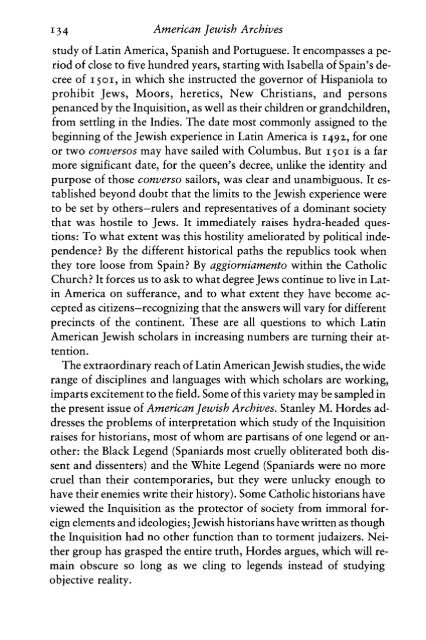Introduction - American Jewish Archives
Introduction - American Jewish Archives
Introduction - American Jewish Archives
Create successful ePaper yourself
Turn your PDF publications into a flip-book with our unique Google optimized e-Paper software.
I34 <strong>American</strong> <strong>Jewish</strong> <strong>Archives</strong><br />
study of Latin America, Spanish and Portuguese. It encompasses a pe-<br />
riod of close to five hundred years, starting with Isabella of Spain's de-<br />
cree of 1501, in which she instructed the governor of Hispaniola to<br />
prohibit Jews, Moors, heretics, New Christians, and persons<br />
penanced by the Inquisition, as well as their children or grandchildren,<br />
from settling in the Indies. The date most commonly assigned to the<br />
beginning of the <strong>Jewish</strong> experience in Latin America is 1492, for one<br />
or two conversos may have sailed with Columbus. But 1501 is a far<br />
more significant date, for the queen's decree, unlike the identity and<br />
purpose of those converso sailors, was clear and unambiguous. It es-<br />
tablished beyond doubt that the limits to the <strong>Jewish</strong> experience were<br />
to be set by others-rulers and representatives of a dominant society<br />
that was hostile to Jews. It immediately raises hydra-headed ques-<br />
tions: To what extent was this hostility ameliorated by political inde-<br />
pendence? By the different historical paths the republics took when<br />
they tore loose from Spain? By aggiorniamento within the Catholic<br />
Church? It forces us to ask to what degree Jews continue to live in Lat-<br />
in America on sufferance, and to what extent they have become ac-<br />
cepted as citizens-recognizing that the answers will vary for different<br />
precincts of the continent. These are all questions to which Latin<br />
<strong>American</strong> <strong>Jewish</strong> scholars in increasing numbers are turning their at-<br />
tention.<br />
The extraordinary reach of Latin <strong>American</strong> <strong>Jewish</strong> studies, the wide<br />
range of disciplines and languages with which scholars are working,<br />
imparts excitement to the field. Some of this variety may be sampled in<br />
the present issue of <strong>American</strong> <strong>Jewish</strong> <strong>Archives</strong>. Stanley M. Hordes ad-<br />
dresses the problems of interpretation which study of the Inquisition<br />
raises for historians, most of whom are partisans of one legend or an-<br />
other: the Black Legend (Spaniards most cruelly obliterated both dis-<br />
sent and dissenters) and the White Legend (Spaniards were no more<br />
cruel than their contemporaries, but they were unlucky enough to<br />
have their enemies write their history). Some Catholic historians have<br />
viewed the Inquisition as the protector of society from immoral for-<br />
eign elements and ideologies; <strong>Jewish</strong> historians have written as though<br />
the Inquisition had no other function than to torment judaizers. Nei-<br />
ther group has grasped the entire truth, Hordes argues, which will re-<br />
main obscure so long as we cling to legends instead of studying<br />
objective reality.

















